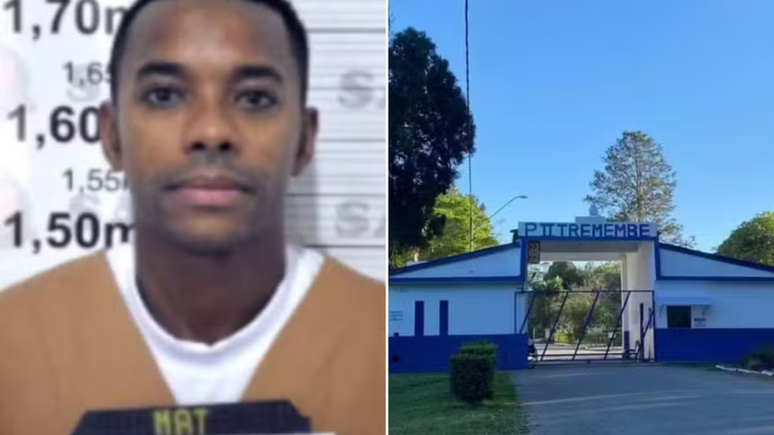In the STF plenary vote, the majority decided to keep former footballer Robinho in prison for rape
html[data-range=”xlarge”] figure image img.img-f73121b3bad4f2d47c2940d137acbf64y3qy6i4d { width: 774px; height: 435px; }HTML[data-range=”large”] figure image img.img-f73121b3bad4f2d47c2940d137acbf64y3qy6i4d { width: 548px; height: 308px; }HTML[data-range=”small”] figure image img.img-f73121b3bad4f2d47c2940d137acbf64y3qy6i4d, html[data-range=”medium”] figure image img.img-f73121b3bad4f2d47c2940d137acbf64y3qy6i4d { width: 564px; height: 317px; }HTML[data-range=”small”] .article__image-embed, html[data-range=”medium”] .article__image-embed {width: 564px; margin: 0 automatic 30px; }
The Federal Supreme Court (STF) decided this Friday (22nd) to keep the former player in prison Robinhoconvicted of gang rape in Italy. Six of the eleven ministers voted in favor of continued detention, while the minister Gilmar Mendes He was the only one to take a stand in favor of the former athlete’s freedom. The process, which took place electronically, will continue until Tuesday (26th), with the possibility of new votes and requests for revision. Robinho He is serving a nine-year sentence in Tremembé, after the Superior Court of Justice (STJ) ruled that he should serve the sentence in Brazil.
The STF ministers analyze two requests for freedom made by the former player’s defense. The journalist in the case, Luiz Fux, argued that there was no illegitimacy in determining the immediate execution of the sentence, highlighting that the STJ’s decision was based on constitutional principles. Fux declared that the STJ’s decision did not violate any constitutional rules or international treaties, allowing the sentence to be enforced in Brazil.
In his vote, the minister Alexander of Moraes reiterated that the execution of the sentence does not disrespect the principle of the presumption of innocence, since the conviction was based on the completion of a complete judicial process. He also addressed the extraterritoriality of the sentence, underlining that the inability to extradite Brazilians does not imply impunity, since Brazilian legislation allows the execution of sentences applied abroad, as long as certain legal requirements are met.
The defense of Robinho disputes the validity of sentence enforcement in Brazil, arguing that the Immigration Law, which allows the transfer of sentences from other countries, should not be applied to crimes committed before its entry into force. Furthermore, lawyers question the competence of the STJ in determining the arrest without analyzing the appeals submitted. The expectation now is that the STF will conclude the process, defining the future of the former player.
The STF has the majority to keep Robinho in prison https://t.co/4LCgNzonxU#g1pic.twitter.com/KjczVM8WDo
— g1 (@g1) November 22, 2024
Source: Terra
I am Amanda Gans, a motivated and ambitious professional in the news writing industry. With over five years of experience in this field, I have developed an eye for detail and an ability to craft stories that captivate readers. I currently write for Gossipify, where I specialize in beauty & celebrities news. My passion lies with exploring the world of beauty through writing, interviewing experts and developing articles that are both informative and entertaining.
You may also like

Paola Carosella breaks the silence and comes to the defense of Renata Vanzetto after the MasterChef mockery
The former MasterChef Brasil judge spoke out on social media and supported her professional colleague

Internet chooses the worst dressed at Mari Fernandez’s wedding: ‘Always strange’
Singer Mari Fernandez marries influencer Julia Ribeiro in the hinterland of São Paulo, on the

Vini Jr.’s Mother Surprises Him Enjoying a Night Out with Virginia After Reconciliation: ‘Enemy’
Fernanda Cristina was present alongside Virginia Fonseca at the Grande Rio trials, strengthening her good

TFF1 TFF1, finished: How to see the end of the 2nd Detective Series Season 2?
On Wednesday, August 27, TF1 released Tracker broadcasting, a new detective series hosted by Justin

Paola Carosella breaks the silence and comes to the defense of Renata Vanzetto after the MasterChef mockery
The former MasterChef Brasil judge spoke out on social media and supported her professional colleague

Ana Maria Braga cries when she talks about cancer with Carolina Dieckmmann
The presenter met the actress shortly after receiving the first diagnosis of the disease Ana

SEVENTEEN announces a documentary series on Disney+. Watch the trailer
“SEVENTEEN: Our Chapter” reveals the K-pop group’s journey, challenges and dreams in four exclusive episodes


